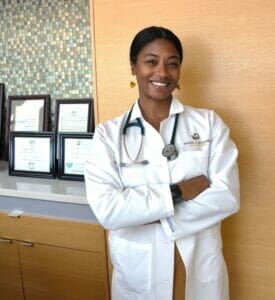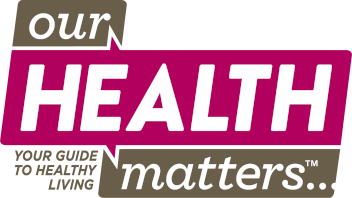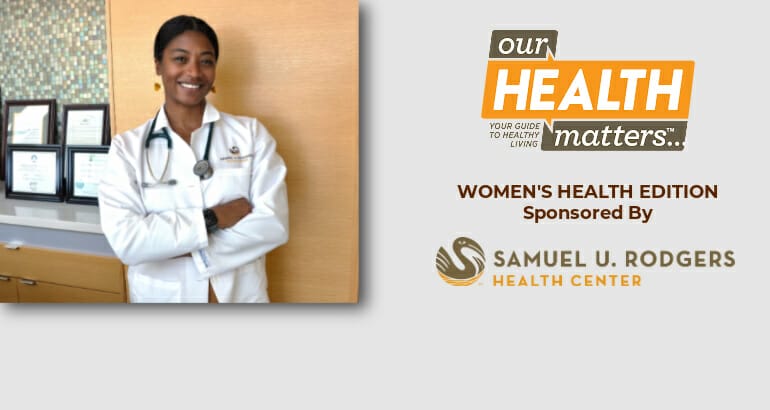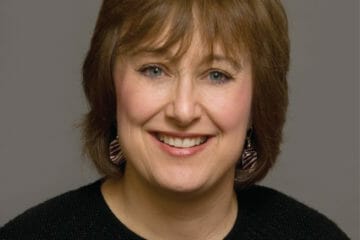
At the start of my business career I had the privilege of working with Samuel U. Rodgers, MD, MPH, a highly respected physician and the founder of the first FQHC (federally-qualified community health center) in Missouri. Dr. Rodgers commanded the room with his warm and compassionate demeanor and medical expertise. His vision encompassed an understanding of health equity, diversity and inclusion long before they were kitchen table conversations. At the health center, chronic health conditions such as hypertension, diabetes and heart disease then and still today disproportionately impacted people of color, the uninsured and under-insured.
— Ruth Ramsey
Quality Healthcare—Mission Accomplished!
After more than 50 years, Rodgers Health continues to demonstrate its passion for delivering quality healthcare services to all who walk through their doors, regardless of their ability to pay.
Today, under the leadership of President and CEO Bob Theis, the chief medical director, executive leadership teams and dedicated staff, patients are assured their physical, mental and social needs receive the highest levels of care.
Our October edition is focused on women’s health. Ruth Ramsey, Editor-in-Chief, interviewed Robbie Harriford, MD, Chief Medical Officer of Samuel U. Rodgers Health Center, to learn her recommendations for women to achieve optimal health.

Dr. Rodgers believed families deserve access to everything they need to thrive. That’s why he chose to open his health center in 1968 at the Wayne Miner Housing Project, so families could receive the care they needed right in the heart of their community. Family was the focus of Dr. Rodgers’ vision, and family is still at the heart of Rodgers Health today. In 1988, the Wayne Miner Health Center was renamed in honor of Dr. Rodgers, becoming the Samuel U. Rodgers Community Health Center.
Our Health Matters asked Dr. Harriford to share how they deliver the right care at the right time.
OHM: To what do you attribute Samuel Rodgers Health Center’s success in serving families for more than 50 years?
Dr. Harriford: I think it comes down to compassion and accessibility. Everyone who works here is passionate about helping our patient population. We are unique in that we serve an extremely diverse population, with speakers of close to 40 languages. Our patients often do not have health insurance and because of this, some have not seen a medical provider in years and have numerous complex issues.
Our compassion is seen in all aspects of the care we provide, from the greeters at the front entrance to the medical team and support staff, all the way up to those in executive leadership.
OHM: Some women may not see a doctor regularly. Why is it important for women to have a primary care doctor and get annual or well-woman exams?
Dr. Harriford: Primary care is about preventing health problems—we want to keep you healthy, and the best way to do that is for you to come see us every year for your annual exam. That is a good time to ask questions regarding your health and any concerns you may have. Our patients are part of the care team. Our goal is to keep them as healthy as possible!
OHM: What are some of the chronic health conditions impacting women and the screenings or exams that detect them?
Dr. Harriford: Breast cancer and cervical cancer are the two that come to mind—both of which we screen for (depending on one’s age) when you see us for an annual exam. We provide mammograms for early detection of breast cancer and a pap smear to detect early signs of cervical cancer. We are also seeing higher rates of high blood pressure and diabetes in women—both of which can be prevented with regular visits to a primary care physician who can help them develop steps to incorporate healthier habits.
OHM: What is Rodgers Health doing to improve the maternal and infant health outcomes of Black and Brown mothers, a population who experiences the highest mortality or deaths?
Dr. Harriford: We recently received a grant to start a Prenatal and Postpartum Health Home, which is a program that provides more comprehensive services to our obstetrics (OB) patients during their pregnancy and for 18 months after the baby arrives. Our OB case management for high-risk patients improves OB care coordination, access to integrated behavioral health and access to bilingual doula services. We have been able to determine the concerns our patients have expressed, and we are proactively trying to address those with this program. The program is fairly new, but we are already excited about some results we are seeing. For example, with our new OB RN Case Manager, we have been able to better coordinate care for our high-risk moms to ensure that they are getting the appointments they need. One patient has a severe heart problem, and with the help of our case manager, we are able to assist her to get an appointment in an appropriate time frame.
OHM: What do you want women to know about getting a mammogram screening?
Dr. Harriford: Mammograms help us detect breast cancer at the earliest stages, which is extremely important. The earlier we can detect cancer and get a patient into treatment, the better their chances of survival.
OHM: What vaccines are currently available, and does someone need to be a patient to get vaccinated at Rodgers Health?
Dr. Harriford: We now have the flu vaccine. It is available to the public and you do NOT have to be a patient of ours to receive it. We have a walk-in clinic where people can easily receive it. Our pediatric department offers all recommended childhood immunizations, which you DO need to be a patient to receive. I also recommend getting the flu vaccine along with the COVID vaccines.
A new RSV vaccine is available for pregnant mothers. Respiratory syncytial (sin-SISH-uhl) virus, or RSV, is a common respiratory virus that usually causes mild, cold-like symptoms. Most people recover in a week or two, but RSV can be serious. Infants and older adults are more likely to develop severe RSV and need hospitalization. RSV can be found in the lungs of newborns and young children. It can make them very sick and is responsible for increased hospitalizations. By immunizing the mom, we can help provide protection for babies too.
OHM: How has telehealth made healthcare delivery more accessible and convenient?
Dr. Harriford: Telehealth gives busy moms and others the option to receive care if they don’t have access to transportation, or if they need to be at home with their children. It allows care to continue despite barriers.
OHM: What type of care should a patient consider for telehealth?
Dr. Harriford: A number of visits can happen through telehealth: behavioral health, family planning, follow-up visits and prenatal care, just to name a few. It allows the patient to feel more comfortable because they are in their own environment and it feels less clinical. It also allows care to continue despite of lack of transportation or childcare.
OHM: What are some ways in which women can practice self-care?
Dr. Harriford: Self-care is vital to our health! I tell women to prioritize sleep, eat healthy, get regular exercise, keep your social connections, and also do things to help improve or maintain your mental health such as yoga, meditation or journaling. Overall, it’s about recognizing what makes YOU happy and devoting time to it on a regular basis.
OHM: How does stress impact women’s physical and mental health?
Dr. Harriford: Stress can cause physical and mental distress in women. It can manifest in physical ailments such as stomach pain, headaches and increase in weight, and it can also bring on depression and anxiety. Women often carry the weight of many responsibilities for the family. I encourage any woman who is experiencing more than normal stress (not sleeping, feeling hopeless and losing interest in social activities) to make an appointment for mental health counseling or therapy.
OHM: What mental health services are available?
Dr. Harriford: We offer a range of services to support mental health for children and adults. Some include integrative behavioral health, which is when one of our behavioral health consultants (BHC) accompanies a patient during their medical visit and helps with identifying services. For instance, if a patient is depressed and wants immediate help, we don’t have to wait to get an appointment with a therapist. Our BHC can assess the situation and start to provide services at that time. It has been a game changer for our patients!
OHM: What are some healthy habits you recommend women adopt?
Dr. Harriford: I strongly urge women to eat less carbohydrates and greasy/fatty foods and get some form of exercise every day for at least 30 minutes. You don’t have to go run a marathon—even just a simple walk helps. Keeping your mind sharp with reading is also a great habit to start and keep up. I personally love to do yoga as a way to keep my mind and body in check. Some women like to write as a healthy self-care option.
OHM: Do you offer any healthy lifestyle events, programs or activities?
Dr. Harriford: Rodgers Health offers a variety of health events. We encourage people to visit our website (samrodgers.org) on a regular basis to see what’s available.
Whether it’s women’s health, men’s health, or children’s health, Samuel U. Rodgers Health Center is prepared to deliver quality healthcare.
For information about the health services, locations, hours of operation, making an appointment and assistance with insurance enrollment, call 816-474-4920 and visit samrodgers.org. •






